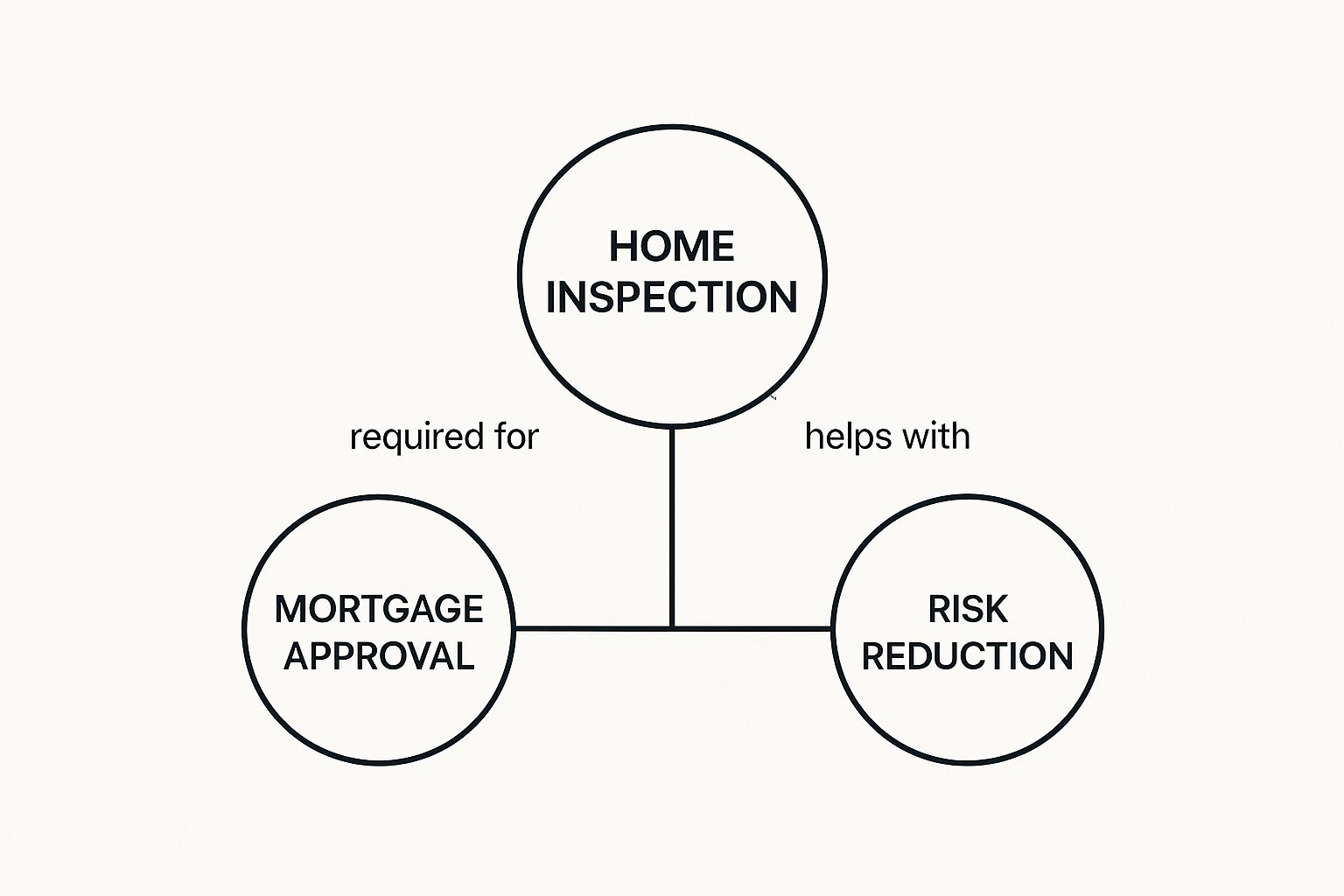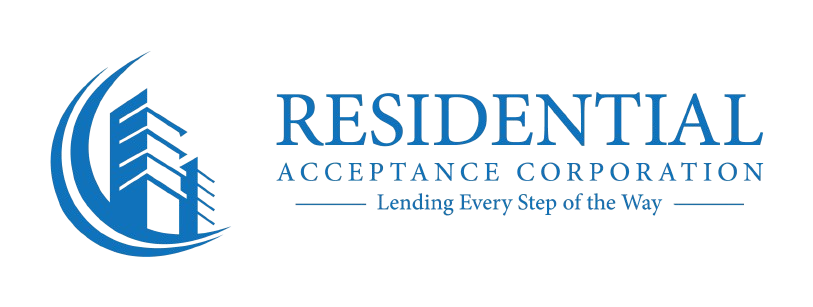Let's cut right to it: is a home inspection a legal must-have to get a mortgage? Nope, not always. But in the real world of getting a loan, most lenders—including us here at Residential Acceptance Corporation (RAC Mortgage)—are going to strongly recommend, if not flat-out require, one. It's about protecting you and their investment.
Understanding The Home Inspection Requirement
One of the first things that trips up homebuyers is the difference between an inspection and an appraisal. They sound similar, but they do completely different jobs.
Here’s an easy way to think about it: the appraisal is for the lender, but the inspection is for you.
An appraisal just makes sure the house is worth the money you're borrowing. The home inspection, on the other hand, is like a full health check-up for the property. It digs into the condition of all the critical systems and structural parts, giving you a crystal-clear picture of what you're really buying. This is especially vital if you're new to the game; our https://www.racmortgage.com/first-time-homebuyer-guide/ can walk you through more of these key steps.
Understanding Home Inspection vs Home Appraisal
To really nail down the differences, let's break down how a home inspection and a home appraisal stack up against each other. They're both essential pit stops on the road to closing, but they're looking for very different things.
| Aspect | Home Inspection | Home Appraisal |
|---|---|---|
| Purpose | To evaluate the physical condition and safety of the property for the buyer. | To determine the fair market value of the property for the lender. |
| Who It’s For | Primarily for the homebuyer's benefit and peace of mind. | Primarily for the lender to ensure the loan amount is justified. |
| What It Covers | Structural integrity, roofing, HVAC, plumbing, electrical systems, and potential defects. | Property size, location, comparable recent sales (comps), and overall market condition. |
| Outcome | A detailed report outlining existing issues, necessary repairs, and potential future problems. | A valuation report that confirms the home’s value is at or above the sale price. |
| Is it Negotiable? | Often optional but highly recommended; findings can be used to negotiate repairs or price. | Almost always required by the lender as a condition of the mortgage. |
Seeing them side-by-side makes it clear: the appraisal protects the loan, while the inspection protects your future home and wallet.
Why It's A Near-Universal Expectation
Even when the law doesn't force your hand, the inspection has become a standard part of buying a home. Lenders see it as a non-negotiable tool for managing their risk. Why would they want to lend hundreds of thousands of dollars on a property that has a cracked foundation or a faulty electrical system?
While it’s not a universal rule, the numbers show how ingrained this has become. In practice, a whopping 83% of homebuyers who got an inspection said their lender insisted on it before signing off on the loan. It's just smart business.
This visual really drives home the connection between an inspection, reducing risk, and getting that mortgage approved.

As you can see, that inspection report acts as a critical safeguard, proving the home is a sound asset for everyone involved. To get a feel for how this piece fits into the larger puzzle of getting your financing in order, you can check out the steps in Australia's Home Loan Approval Process.
Why Your Lender Cares About the Home Inspection
Ever wonder why your mortgage lender is so interested in the condition of the home you want to buy? It might feel like just another step in a long process, but from a lender's perspective—like ours at Residential Acceptance Corporation (RAC Mortgage)—a home inspection is a critical risk-management tool. We're financing a major asset, and we need to be sure that asset is sound.
Think of it this way: the home you’re buying is the collateral for the mortgage. If, for any reason, a borrower defaults on their loan, the lender might have to take possession of the property to recoup their investment.

Now, imagine that property has significant, undisclosed issues like a cracked foundation or ancient, faulty wiring. It becomes a high-risk asset. In that condition, the home could be worth far less than the loan amount, making it incredibly difficult for the lender to recover their investment if they have to sell it.
Protecting the Investment for Everyone
A solid home inspection report gives lenders the confidence that they're financing a stable, secure property. It confirms the home doesn’t have major defects that could drain your finances and, in a worst-case scenario, lead to foreclosure. It's a protective measure that benefits everyone involved.
When an inspector does flag major issues, it doesn't automatically kill the deal. Far from it. This is often when negotiations begin, and repairs might be required before the loan can be finalized. This directly ties into the next stage of the mortgage process. You can learn more by reading our guide on what conditional approval for a mortgage means, as inspection results frequently influence these conditions.
The lender’s interest in the inspection is fundamentally about asset protection. A home with a clean inspection report is a stable investment, reducing risk for the lender and preventing future financial hardship for the borrower.
Ultimately, lenders care because a problem-free home is a win-win. You get a safe place to live without the sudden burden of catastrophic repair costs, and we can be confident that our loan is backed by a valuable, well-maintained asset. It’s a partnership where everyone’s goal is a successful, long-term homeownership experience.
When an Inspection Becomes a Mortgage Requirement
While a home inspection isn't always a deal-breaker for a conventional loan on a newer home, certain situations flip the switch from "good idea" to "absolutely mandatory." Think of these as red flags for lenders—signals that there's a higher potential for risk that needs a closer look.
In these cases, a lender like Residential Acceptance Corporation (RAC Mortgage) will require an inspection not just as a friendly suggestion, but as a firm condition to keep the loan process moving.

This shift from "highly recommended" to "required" usually comes down to the specific loan type you're using or the condition of the house itself. Knowing what triggers this requirement helps you prepare and avoid surprises on your path to getting the keys.
Government-Backed Loans Have Stricter Rules
One of the most common reasons for a mandatory inspection is if you're using a government-backed loan. These mortgage products are insured by federal agencies to open the doors of homeownership to more people. But that government backing comes with a few strings attached to protect everyone involved.
- FHA Loans: The Federal Housing Administration isn't just going to back any property. They have a checklist called Minimum Property Standards to make sure a home is safe, secure, and structurally sound. An inspector will be on the lookout for deal-breakers like peeling lead-based paint, a leaky roof, or ancient wiring that has to be fixed before the loan can close.
- VA Loans: The Department of Veterans Affairs has a similar set of rules, known as Minimum Property Requirements (MPRs). The goal is simple: protect veterans from buying a home that's unsafe or a money pit.
- USDA Loans: If you're buying in a rural area with a USDA loan, you can bet there are health and safety standards that an inspector will need to verify before the lender gives the final thumbs-up.
At the end of the day, these government programs are designed to protect both you, the borrower, and the taxpayer money that insures the loan in the first place.
Property Age and Condition as Triggers
It’s not just about the type of loan. The house itself can be the reason an inspection becomes non-negotiable. If the home you have your eye on is on the older side or shows clear signs of deferred maintenance during the appraisal, a lender like RAC Mortgage is going to pump the brakes and ask for a professional opinion.
Financing a historic, century-old home presents a different risk profile than a five-year-old build. Lenders need assurance that the home's foundational, structural, and mechanical systems are still viable and won't lead to immediate, costly failures.
Ultimately, the lender needs to know that the property is a durable asset and a sound investment. A home inspection provides that crucial third-party verification, giving everyone confidence that the house is built to last.
What to Do When the Inspection Finds Problems
Getting an inspection report back that’s filled with issues can feel like a gut punch, but it’s rarely a reason to panic. Think of it as a roadmap for negotiation, not a dead end. Finding problems is actually the norm; research shows a whopping 86% of inspected homes turn up at least one issue.
You'll see things like roof defects pop up in nearly 20% of inspections, with electrical or window problems not far behind at over 18%. This isn't bad news—it's powerful information you can use to protect yourself financially before you sign on the dotted line.

From a lender's perspective, like ours at Residential Acceptance Corporation (RAC Mortgage), tackling these issues head-on is a good thing. It shows you're a responsible borrower who's making sure the property is a solid investment for everyone involved.
Your Three Main Options
When the report reveals a laundry list of needed repairs, you basically have three strategic moves. Which one you choose depends on how serious the problems are, what you're comfortable with, and the wiggle room in your purchase agreement.
-
Request Repairs: You can go back to the seller and ask them to fix specific items before closing day. This is the go-to play for major health and safety concerns, like a leaky roof or sketchy wiring.
-
Negotiate the Price or Credits: If the seller can't or won't handle the repairs, your next move is to negotiate. You could ask for a lower sale price or for seller credits at closing. For instance, if the inspector says you'll need an $8,000 HVAC system soon, you can ask for an $8,000 price drop or a credit to put toward the new unit.
-
Walk Away from the Deal: This is your ultimate safety net. If your contract has an inspection contingency and the problems are just too big to stomach, you can legally back out of the purchase and get your earnest money back. Don't be afraid to use it if you're looking at a money pit.
A detailed inspection report isn't a red flag for your mortgage; it's the foundation for a fair negotiation. It ensures the home you buy is safe and its value is protected, which is a shared goal for both you and your lender.
When an inspection does bring issues to light, you'll likely need an addendum to the purchase agreement to formalize any new terms. You can find some practical examples of an addendum to see how they work.
Why New Construction Homes Still Need an Inspection
It's a common myth, and a tempting one: a brand-new home, with its shiny floors and fresh paint, must be flawless. So why waste money on an inspection? Believing this can be a surprisingly expensive mistake.
Even the most beautiful new builds can hide problems under the surface, from simple construction mistakes to overlooked details. Subcontractors can make errors, building codes can be misinterpreted, and sometimes things just get missed in the final push to finish a project.
An independent inspector works for you, not the builder. They provide an unbiased, expert opinion on the quality of the work before you sign on the dotted line, making sure everything is truly ready for you to move in. For a lender like Residential Acceptance Corporation (RAC Mortgage), an inspection on a new home is a non-negotiable step. It’s our way of confirming the finished property meets the required quality standards and that its actual condition matches the appraisal value.
Catching Problems Before They're Hidden
One of the smartest moves you can make with a new build is to schedule a phased inspection, which might include a check before the drywall goes up.
A pre-drywall inspection lets a professional examine the home's skeleton—the framing, plumbing, and electrical systems—before it all gets covered up by insulation and drywall. Finding a mistake at this stage is worlds easier and cheaper than having to tear down a wall later.
Think of it as a small investment upfront to save yourself from massive headaches and surprise expenses down the road. It’s the ultimate peace of mind, knowing your home is sound from the inside out.
The mortgage industry shares this cautious approach. Recent data shows that even as market demand settles, it's still standard practice for buyers to get mortgage approvals that are contingent on a clean home inspection. It's a tried-and-true way for both buyers and lenders to catch defects before a loan is finalized. You can dig into more details on mortgage application trends for new homes to see how this plays out in the market.
The Long-Term Value of Your Home Inspection Report
It's easy to look at the home inspection as just another task on your mortgage checklist. But seeing it that way is a big mistake. Your inspection report is one of the most valuable documents you'll get as a new homeowner, and its benefits last long after you've closed on the house.
Whether Residential Acceptance Corporation (RAC Mortgage) requires it for your loan or not, this report is your first real step toward being a confident and responsible homeowner. It’s not just a simple pass/fail grade; think of it as a detailed user manual for your new home, giving you a complete picture of its current condition.
Your Future Maintenance Roadmap
Your inspection report is basically a personalized maintenance plan handed to you on a silver platter. It points out the age and condition of the big-ticket items, like your HVAC system and water heater, which helps you start budgeting for when they'll eventually need to be replaced.
It also highlights the smaller upkeep items you'll need to keep an eye on, turning the overwhelming unknown of home maintenance into a manageable plan. You're not just buying a house; you're making a secure investment.
The consistent number of purchase mortgages shows that plenty of buyers are still out there. This fuels a steady demand for home inspections as lenders often require them to get a clear picture of a property's condition before approving a loan. To learn more about how these trends affect the industry, you can check out this analysis of the housing market and mortgage trends for home inspectors.
An inspection report empowers you to make a fully informed decision. It’s about ensuring the home you love is also a home you can count on for years to come.
At the end of the day, the inspection gives you one thing money can't buy: peace of mind. It transforms what can be an intimidating process into a solid foundation for your future.
Common Questions About Inspections and Mortgages
As you get closer to the finish line of your home purchase, it’s natural for last-minute questions to pop up. Let’s clear up some of the most common queries homebuyers have about the relationship between home inspections and mortgages, so you can head to closing with confidence.
Does My Lender Choose the Inspector
Nope. As the homebuyer, you are the one who chooses and hires your own inspector.
Lenders like Residential Acceptance Corporation (RAC Mortgage) actually prefer it this way. They want an impartial, third-party assessment of the property. They expect you to find a certified professional who is working just for you, ensuring your best interests are the top priority.
Can I Waive the Inspection
You can, but it’s a massive risk. Waiving an inspection means you’re agreeing to buy the home "as-is" and taking on full responsibility for any and all hidden issues that might surface later.
While it might seem like a good way to make your offer stand out in a bidding war, there's a huge catch. If your mortgage lender requires an inspection as a condition of your loan, you simply cannot waive it and expect to get your financing.
A bad inspection report almost never leads to an automatic mortgage denial. Instead, it typically opens the door for negotiations between you and the seller to address the problems found.
Will a Bad Report Get My Mortgage Denied
It's highly unlikely. Lenders aren't looking for a perfect house; they just need to know the property is a sound investment and meets basic safety standards.
If a bad report comes back, the lender will usually just wait for you and the seller to figure out a solution. This could mean the seller pays for repairs, or you get a price adjustment on the home. Getting everything in order starts with a solid financial footing; understanding how to get preapproved is a great first step on that journey. For additional insights on various real estate topics, the TitleTrackr blog can also be a useful resource.
Ready to take the next step toward homeownership with confidence? The team at Residential Acceptance Corporation is here to guide you through every stage, from pre-approval to closing. Get Started with RAC Mortgage Today!

